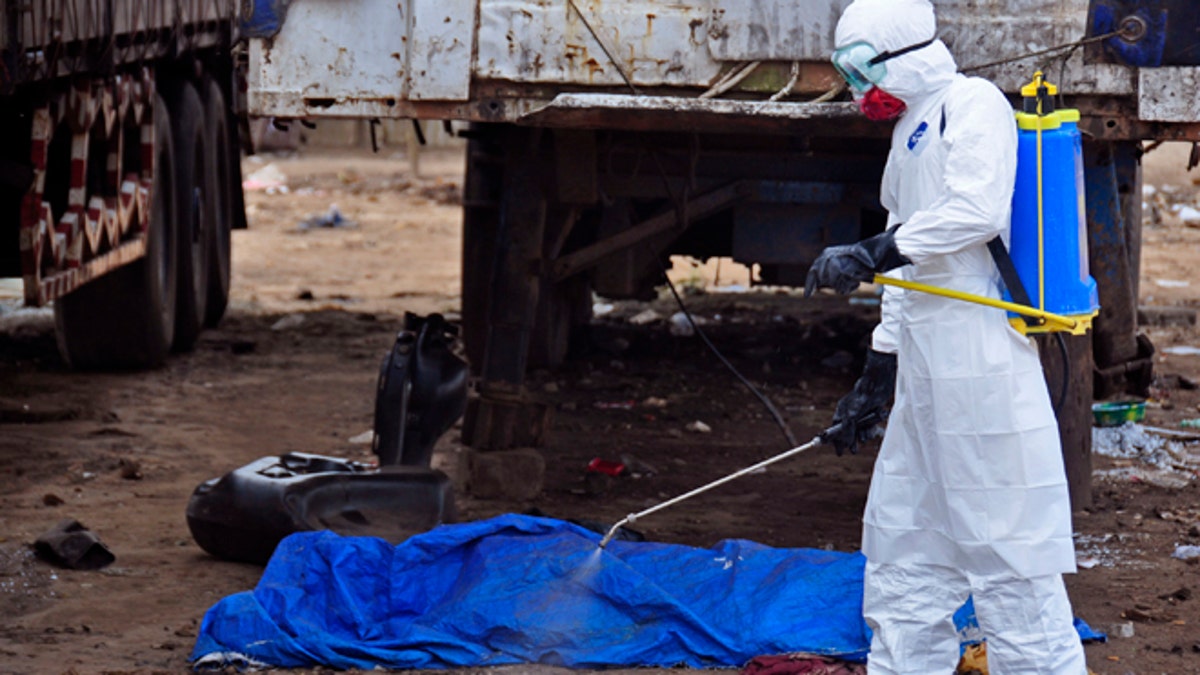
Aug. 12, 2014: The body of a man found in the street, suspected of dying from the Ebola virus, is sprayed with disinfectant in the capital city of Monrovia, Liberia. (AP)
Long-awaited studies of two possible Ebola vaccines are set to begin in West Africa in a couple of weeks, starting in Liberia, U.S. officials said Thursday.
The first study will compare the two experimental vaccines with dummy shots in hopes of proving whether either really protects against the Ebola virus, which has devastated Liberia, Guinea and Sierra Leone over the past year.
A second study of one of the vaccines is being planned for Sierra Leone.
New infections are falling, which can make it harder to tell if a vaccine is effective. But clusters of cases continue and Dr. Anthony Fauci of the National Institutes of Health said the vaccines still could be useful if there's a rebound, as well as for what he called inevitable future outbreaks of Ebola.
"Unless you extinguish the very last case, it's not over `til it's over," said Fauci, director of the National Institute of Allergy and Infectious Diseases.
Fauci said up to 27,000 people could ultimately be enrolled in the larger Liberian study, starting with about 600 in the first phase. The study could last as long as a year. The Centers for Disease Control and Prevention is working with the government of Sierra Leone to design the second study, which officials said could enroll about 6,000 people.
"Everybody's been racing to get trials launched as quickly as we could and as carefully as we could," said Dr. Anne Schuchat, director of CDC's National Center for Immunization and Respiratory Diseases.
In addition to the vaccines, Fauci said scientists also will test the Ebola drug ZMapp in the U.S. and Liberia. The experimental treatment made headlines when it was given to several Ebola patients last summer, before manufacturer Mapp Biopharmaceutical Inc. ran out of doses. But it has not been formally tested for safety and effectiveness in people, and U.S. officials said there now is enough supply to begin doing so.
The World Health Organization says the Ebola epidemic has infected more than 21,000 people and claimed more than 8,600 lives. Without a vaccine, officials have fought the outbreak with old-fashioned public health measures, including isolating the sick, tracking and quarantining those who had contact with them, and setting up teams to safely bury bodies.
Fauci said both experimental vaccines showed promise in first-stage human safety tests. One was developed by the NIH and is being manufactured by GlaxoSmithKline. The other was developed by Canadian health officials and is licensed to two U.S. companies, NewLink Genetics and Merck. Each uses a different virus to carry non-infectious Ebola genetic material into the body and spark an immune response.
The study in Liberia will randomly assign people to get either one of the vaccines or a dummy shot, considered the best way to prove if there's really an effect. Fauci said even if the current outbreak continues to wane - "which would be a good thing for all" - that it would be possible to get some idea of how effective the vaccines are. Some of the participants will undergo special testing to see how their immune systems respond to the shots.








































